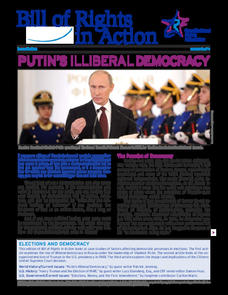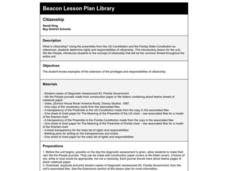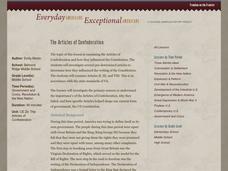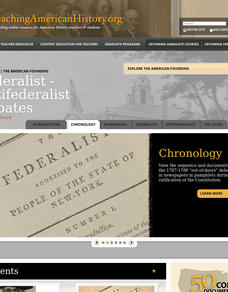Curated OER
The Constitution
Students determine that the rules that we follow in America were written in the Constitution. They study a copy of the constitution and discuss how it compares and differentiates from the plan the class has written. They recite our...
Curated OER
Constitution Day
Students discuss the need for rules in their community and classroom. Using this information, they identify the authority figures at their house, at school and in the community. They are read a book about following the rules and listen...
Curated OER
Declaration of Independence
Students explore the US Constitution. In this Bill of Rights lesson, students work in pairs to select and examine amendments to the Bill of Rights. Students will identify what the amendment means, why they chose it, what it protects, and...
University of Arkansas
Promises Denied
"Promises Denied," the second instructional activity in a unit that asks learners to consider the responsibilities individuals have to uphold human rights, looks at documents that illustrate the difficulty the US has had trying to live...
School Improvement in Maryland
Dividing the Powers of Government
Who does what? To develop an understanding of the balance of power between the US federal and state governments, class members research responsibilities in terms of legal systems, security issues, economic activities, lawmaking, and...
Encyclopedia Britannica
Presidential Qualifications
Can anyone grow up to be president of the United States? As part of their study of the 2020 election, groups research the constitutional requirements to become president. The class then brainstorms a list of qualifications beyond those...
Curated OER
Picture Books and the Bill of Rights
Students identify the basic freedoms of citizens in the United States. In this Bill of Rights lesson, students act out scenarios about the Bill of Rights. Students create a picture book describing the rights they've acted out.
Constitutional Rights Foundation
Putin's Illiberal Democracy
Is Russia really a democracy? High school scholars explore Russian democracy under the leadership of President Putin. The resource provides opportunity for group discussion, writing, and research to understand Russia's political history,...
Curated OER
The Beginnings of Constitutional Government
Students examine excerpts of Thomas Paine's Common Sense. In this early American history lesson plan, students read Paine's pamphlet and analyze the information according the rubric provided.
Curated OER
Lesson 1: Map Data and the Census
Students learn about the history of the census. In this U. S. Census lesson plan, students develop an understanding about how the United States Constitution grants and distributes power and discover how the spatial organization of...
Curated OER
Court Cases Testing the Establishment of Religion
Although the PowerPoint this lesson plan calls for is unavailable, you could easily create a presentation to fulfill its purpose. Learners listen to a presentation and keep track of the information with a graphic organizer that looks at...
Close Up Foundation
Rights Auction
In an engaging activity on universal and unalienable rights, learners work in groups to establish a democratic nation and determine what principles they want to protect to ensure a democratic society. They conduct a "rights auction" in...
Foreign Policy Association
U.S. and Europe Online Lesson Plan
Class groups investigate the economic and political implications of a country's policies on genetically modified foods, craft a position paper detailing that policy, and share their findings with the class. Armed with this information,...
Core Knowledge Foundation
Volume 1 - A History of the United States: Precolonial to the 1800s
Volume One of the 299-page Core Knowledge History of the United States covers events from the Precolonial Period to the 1800s.
Curated OER
Understanding The Preamble
Students explore the Preamble of the U.S. Constitution. In this government instructional activity, students write a preamble to encourage cooperation in their classroom as they study the Preamble of the U.S. Constitution.
Curated OER
Citizenship
Fifth graders read the preamble of the U.S. and Florida Constitutions. They discuss vocabulary definitions surrounding the concept of citizenship. They discuss and write about the rights and responsibilities of citizens and apply their...
Curated OER
Latinos and the Fourteenth Amendment: A Primary Source Document Activity
Eighth graders explore the effect of the Fourteenth Amendment. In this US History lesson, 8th graders read and analyze primary source documents. Students write a three minute paper demonstrating their understanding of the fourteenth...
Curated OER
What Makes Us Free?: Maine's Declaration of Rights
Students analyze Maine's Declaration of Rights. They review state constitutions and declaration of rights and their importance. They analyze a section of Maine's Declaration of Rights and crete their own declarations of rights. They...
Roy Rosenzweig Center for History and New Media
The Articles of Confederation
Have you ever started a project only to realize you need to scrap it and start over? Scholars analyze the issues leading to the fall of the Articles of Confederation. A group investigation into Articles II, III, and VIII unveil the...
College Board
Balance of Power Between Congress and the President
Three branches of government help create a system of checks and balances. A helpful resource provides a series of articles regarding the balance of power between the legislative and executive branches of government. Historians answer...
Constitutional Rights Foundation
Conservation, Preservation, and the National Parks
Going green? Scholars investigate the creation of the US National Park program. Through diary entries as well as expert testimony, they synthesize information and analyze the need for conservation and preservation. Finally, they display...
Anti-Defamation League
Women's Suffrage, Racism, and Intersectionality
The Nineteenth Amendment granted women the right to vote—as long as they were white. High schoolers read articles and essays about racism in the suffrage movement and consider how intersectionality played a role in the movement. Scholars...
Ashbrook Center at Ashland University
Federalist - Antifederalist Debates
Who should have the power—individual states or the federal government? Scholars research the arguments of the Federalists and Anti-Federalists during the formation of the United States Constitution. Online resources, including a vast...
Curated OER
Role Playing Free Speech
Students conduct research into looking at a free-speech issue. They role play the events surrounding a court case. The lesson includes guiding questions to help create context and determine areas of further study. The presentation...

























